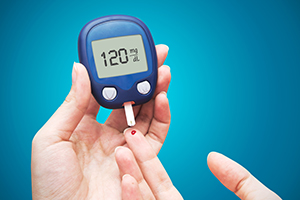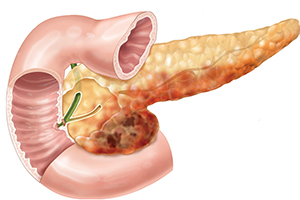The Hirshberg Foundation is actively funding research into pancreatic cancer risk factors in order to find early detection methods and better treatment options. Scientists are exploring whether certain genes and genetic mutations increase the risk of pancreatic cancer, as well as how the factors such as diet, obesity and inflammation can accelerate tumor development.
When there is a cancer diagnosis, it’s natural to wonder what may have caused the disease. Doctors can’t always explain why one person gets pancreatic cancer and another doesn’t. However, we do know that people with certain risk factors may be more likely than others to develop cancer of the pancreas.
A risk factor is something that has been associated with an increased risk of getting a disease. Some examples are controllable risk factors that can be changed, such as smoking or diet. Other risk factors are uncontrollable like age or family history. Having a risk factor, or even multiple, does not ensure that you will get cancer, just as some people with few or no risk factors may develop cancer.
Studies have found the following risk factors for cancer of the pancreas:
Tobacco Use

Diabetes

Obesity

Chronic Pancreatitis

Family history

Race (Ethnicity)

Inherited Genetic Syndromes
Inherited gene mutations can be passed from parent to child and may cause as much as 10% of pancreas cancers. Some of these gene mutations cause syndromes that include increased risk of cancer, as well as other health issues. Inherited genetic syndromes that researchers are currently studying for their connection to pancreatic cancer, include:
- Hereditary breast cancer
- Hereditary ovarian cancer
- Familial atypical multiple mole melanoma (FAMMM) syndrome associated with skin and eye melanomas
- Lynch syndrome, also known as hereditary non-polyposis colorectal cancer (HNPCC)
- Peutz-Jeghers syndrome, also linked with polyps in the digestive tract and several other cancers
- Familial adenomatous polyposis (FAP)
Researchers are also studying:
- Familial (hereditary) pancreatitis, usually caused by mutation in the PRSS1 gene but can also be caused by many other genes.
- Hereditary Cancer Predisposition. Inherited mutations in BRCA1, BRCA2, ATM, PALB2, TP53, certain genes associated with Lynch syndrome (MLH1, MSH2, EPCAM and MSH6), CDKN2A, STK11, and APC have been shown to increase the risk of pancreatic cancer and other cancers. There are other genes that have limited data supporting a possible association with increased risk for pancreatic cancer.
Having an inherited mutation in a gene related to pancreatic cancer does not mean that you will develop pancreatic cancer however you may be at greater risk. Gene mutations that cause some of these syndromes can be found by genetic testing. Learn more about genetic testing & genetic counseling.
The risk factors for pancreatic cancer are an area of research that we are actively funding. Scientists are studying whether a diet high in fat, especially animal fat, or heavy alcohol consumption may increase the risk of disease. We also fund research into whether certain genes and genetic mutations increase the risk of pancreatic cancer. Our researchers are investigating the interplay between diet, obesity and inflammation, as well as how these factors can accelerate pancreatic cancer development.
If you or a loved one are at increased risk for pancreatic cancer, we are here to help. Please contact us for more information or to speak with someone directly.